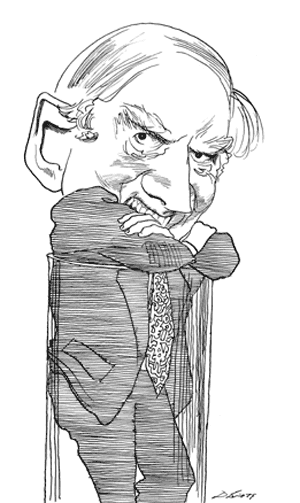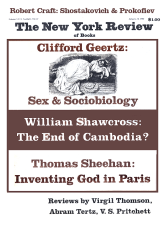Offering unsolicited advice must rank among the most difficult and unpromising of literary forms. Consider poor Polonius. His words are actually quite sensible, even though the man himself is usually played as a garrulous old fool. Laertes, in any case, spends the entire conversation trying to depart gracefully.
Sir Peter Medawar, Nobel laureate and most literate of all biologists, has two advantages over Polonius. His words are not imposed on a captive audience, bound by filial piety. They must be read and weighed by choice—and I write this review primarily to advise(!) that the choice be taken. Moreover, the book is much more than a compendium of exhortations; it is primarily a subtle account of the sociology of creative work in general, written by a man who has been doing it all his life. I suspect that Medawar has chosen Polonius’s format as a device for maintaining wit and some humility in the face of a complex and contradictory world.
Medawar writes about creative lives, not about flashes of genius or careers spent administering the status quo. The primary ingredient of success is staying power—a kind of creative accommodation to the realities of human lives and institutions. Medawar searches for a via media or golden mean between two false and stereotypical views of science. One holds that it is a heartless enterprise, performed by robots in white coats who follow codified, almost automatic, procedures of experiment known as “the scientific method.” The other maintains that good scientists are kooky souls, infected with an indefinable genius leading to eccentricities that must be tolerated to permit the flowering of creativity within. Somewhere between these stereotypes of the pedestrian and the ineffable lie ingredients for the staying power of a creative career. Edison wasn’t far off in his definition of genius as 1 percent inspiration and 99 percent perspiration—though I think he was a bit heavy on the sweat. No one, in any case, could accuse him of insufficient staying power.
Most of Medawar’s advice directs us to this middle path. In discussing the apparatus of experiment, for example, he derides the romantic twaddle that “any scientist worthy of the name can carry out an experiment with no more apparatus than string, sealing wax, and a few empty bean cans.” Yet he also warns against the purchase and use of expensive equipment for its own sake. The intellectual value of an experiment, not the elegance or rigor of available instrumentation, must determine our decision. “If an experiment is not worth doing, it is not worth doing well.” Similarly, while not devaluing discovery, he emphasizes the vital role of patient persistence in working through the details of systems by practiced methods.
Indeed, the achievements of such “intent and unrelaxing study” contain enormous value in themselves and often set the stage for further discovery. In my own field, biology, I think of the amino acid sequences now worked out in detail for many proteins and of genetic maps now available for such intensely studied animals as mice and Drosophila. Indeed Medawar has contempt for the simplistic version (not one ever advanced by Kuhn himself) of T. S. Kuhn’s distinction between the heady, expansive, and propelling confrontation of ideas during scientific revolutions and the dull and plodding puzzle solving of “normal science” during quieter times between: “There is something about Kuhn’s writing that makes me think that he sees normal scientific life as one of settled, God-fearing bourgeois contentment within an established order of things, but in reality it is more like a Maoist microcosm of continuing revolution; in any laboratory conducting original investigation, all is in flux.”
What is this middle path if not the way of most lives? Few people are either creative geniuses or brilliant green thumbs in advanced technology, but most of us come up with a few good thoughts now and again, and most of us can learn to twiddle a dial and even understand something of what goes on inside the machine. Thus the major message of the middle path is the accessibility of science. Most of us can do it, at least at a satisfactory and satisfying level, if we possess sufficient determination. Extending a famous line from T. H. Huxley, Medawar argues that “scientific inquiry is an enormous potentiation of common sense.” And if we choose not to do it, we can at least understand it once we recognize the common bonds of all creative activity—bonds often obscured by jargon, posturing, and the insecurity that fears scrutiny and often expresses itself obversely as arrogance.
Once he has conveyed the major message of accessibility via the middle path, Medawar devotes his attention to precepts for making a scientific life fruitful and enjoyable (or at least less stressful). The messages are not new, but they are worth repeating, especially when said so well. Medawar ties fruitfulness primarily to flexibility, using as an epitome this italicized motto: “I cannot give any scientist of any age better advice than this: the intensity of the conviction that a hypothesis is true has no bearing on whether it is true or not.”
Advertisement
For reducing stress and enhancing enjoyment, Medawar emphasizes simple good manners, an especially important consideration in a profession that assigns status not by something so concrete as cash or what our society calls “real” property, but by the elusive attribute of originality in ideas. Ideas are usually of uncertain parentage since nearly simultaneous, multiple discovery is far more common than lonely originality. Beyond this, ideas can be (and often are) arrogated by a variety of stratagems ranging from simple power of professors over students to distorted claims for earlier antecedents in campaigns to cancel a colleague’s priority. Medawar mentions all the tricks by which scientists take undeserved credit, but finally concludes, in the absence of clear devices and institutions for assigning blame and penalties, that the primary burden must rest internally upon the perpetrator himself: “Scientists know very well when they get up to such tricks as these, and I suspect that each time they are used they bring with them a sense of inadequacy and self-diminishment. This is a pity, for his own good opinion is not the least important of those a scientist seeks to win.” As Polonius said, to thine own self be true.
All these sensible words would sound a bit flat, were they not stated with such style, and surrounded by pithy collateral observations and bons mots. Among a miscellany worth citing, consider Medawar’s characterization of commercial, packaged white bread: “a chemically bleached or otherwise ‘improved,’ devitaminized, revitaminized, steam-baked, presliced parallelepiped in a polyethylene shroud.” Or this on falling asleep at lectures: “If people do sleep in their lectures, speakers should try to get some comfort from the thought that no sleep is so deeply refreshing as that which, during lectures, Morpheus invites us so insistently to enjoy.”
Yet all this emphasis on manners and style reflects a drawback, or at least a limitation, in Medawar’s account. I find him altogether too sanguine on the good sense and rationality of science. He depicts it as an independent activity, potentially (if not actually) ruled by reason and guided by truth. He bypasses all the troubling issues of science as an institution intimately connected with sources of power (tobacco company scientists are still denying what the surgeon general proclaims on all packages of cigarettes). He does not discuss the influence that prevailing cultural biases exert upon the perceived “truths” of science. In short, he accepts science as it is and proceeds to establish canons that would make it more humane and rewarding. Medawar’s book is a manual for successful behavior, not a real analysis of the enterprise itself. It is as if, in trying to spring American hostages from Iran, we discussed only the norms and forms of negotiation and diplomacy, not the sources of Iran’s frustration with us. We do, of course, have to spring the hostages; and if manuals of diplomacy can help, then to hell for now with the deeper reasons. Still, without an analysis of underlying issues, we may be condemned to more trouble after the event. Medawar has written a gentleman’s guide, but I am not sure that the world is, can be, or should be the exclusive preserve of gentlemen.
This Issue
January 24, 1980




